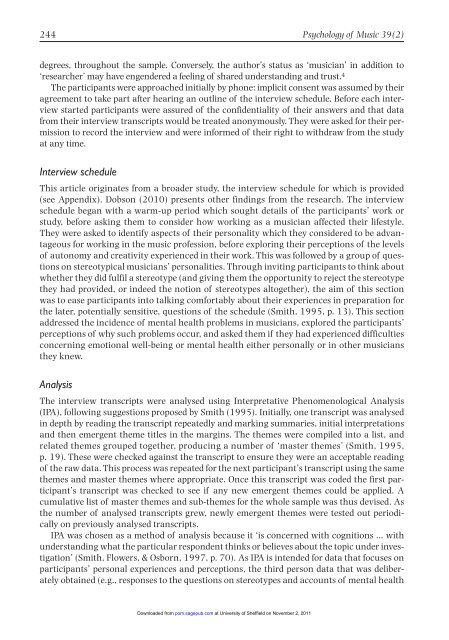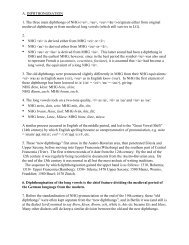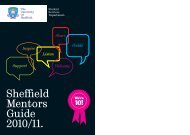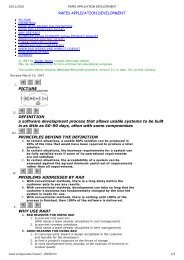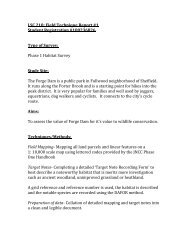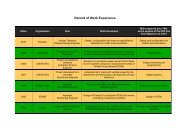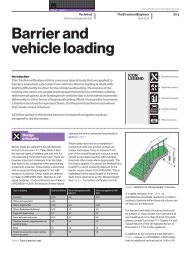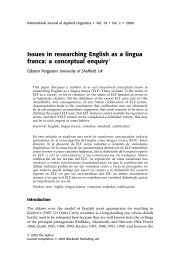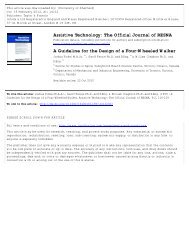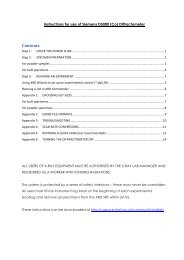Dobson, 2010.pdf - University of Sheffield
Dobson, 2010.pdf - University of Sheffield
Dobson, 2010.pdf - University of Sheffield
Create successful ePaper yourself
Turn your PDF publications into a flip-book with our unique Google optimized e-Paper software.
244 Psychology <strong>of</strong> Music 39(2)<br />
degrees, throughout the sample. Conversely, the author’s status as ‘musician’ in addition to<br />
‘researcher’ may have engendered a feeling <strong>of</strong> shared understanding and trust. 4<br />
The participants were approached initially by phone: implicit consent was assumed by their<br />
agreement to take part after hearing an outline <strong>of</strong> the interview schedule. Before each interview<br />
started participants were assured <strong>of</strong> the confidentiality <strong>of</strong> their answers and that data<br />
from their interview transcripts would be treated anonymously. They were asked for their permission<br />
to record the interview and were informed <strong>of</strong> their right to withdraw from the study<br />
at any time.<br />
Interview schedule<br />
This article originates from a broader study, the interview schedule for which is provided<br />
(see Appendix). <strong>Dobson</strong> (2010) presents other findings from the research. The interview<br />
schedule began with a warm-up period which sought details <strong>of</strong> the participants’ work or<br />
study, before asking them to consider how working as a musician affected their lifestyle.<br />
They were asked to identify aspects <strong>of</strong> their personality which they considered to be advantageous<br />
for working in the music pr<strong>of</strong>ession, before exploring their perceptions <strong>of</strong> the levels<br />
<strong>of</strong> autonomy and creativity experienced in their work. This was followed by a group <strong>of</strong> questions<br />
on stereotypical musicians’ personalities. Through inviting participants to think about<br />
whether they did fulfil a stereotype (and giving them the opportunity to reject the stereotype<br />
they had provided, or indeed the notion <strong>of</strong> stereotypes altogether), the aim <strong>of</strong> this section<br />
was to ease participants into talking comfortably about their experiences in preparation for<br />
the later, potentially sensitive, questions <strong>of</strong> the schedule (Smith, 1995, p. 13). This section<br />
addressed the incidence <strong>of</strong> mental health problems in musicians, explored the participants’<br />
perceptions <strong>of</strong> why such problems occur, and asked them if they had experienced difficulties<br />
concerning emotional well-being or mental health either personally or in other musicians<br />
they knew.<br />
Analysis<br />
The interview transcripts were analysed using Interpretative Phenomenological Analysis<br />
(IPA), following suggestions proposed by Smith (1995). Initially, one transcript was analysed<br />
in depth by reading the transcript repeatedly and marking summaries, initial interpretations<br />
and then emergent theme titles in the margins. The themes were compiled into a list, and<br />
related themes grouped together, producing a number <strong>of</strong> ‘master themes’ (Smith, 1995,<br />
p. 19). These were checked against the transcript to ensure they were an acceptable reading<br />
<strong>of</strong> the raw data. This process was repeated for the next participant’s transcript using the same<br />
themes and master themes where appropriate. Once this transcript was coded the first participant’s<br />
transcript was checked to see if any new emergent themes could be applied. A<br />
cumulative list <strong>of</strong> master themes and sub-themes for the whole sample was thus devised. As<br />
the number <strong>of</strong> analysed transcripts grew, newly emergent themes were tested out periodically<br />
on previously analysed transcripts.<br />
IPA was chosen as a method <strong>of</strong> analysis because it ‘is concerned with cognitions … with<br />
understanding what the particular respondent thinks or believes about the topic under investigation’<br />
(Smith, Flowers, & Osborn, 1997, p. 70). As IPA is intended for data that focuses on<br />
participants’ personal experiences and perceptions, the third person data that was deliberately<br />
obtained (e.g., responses to the questions on stereotypes and accounts <strong>of</strong> mental health<br />
Downloaded from<br />
pom.sagepub.com at <strong>University</strong> <strong>of</strong> <strong>Sheffield</strong> on November 2, 2011


